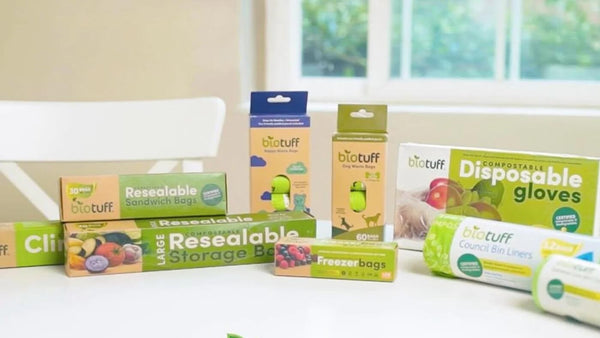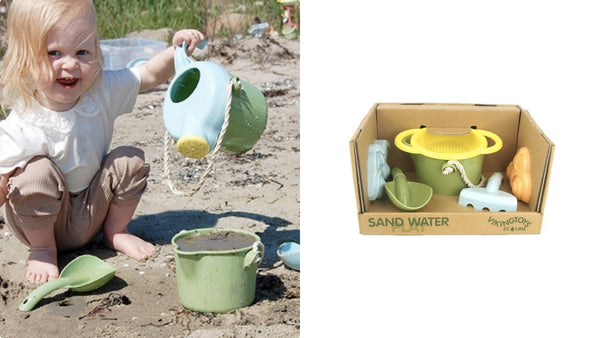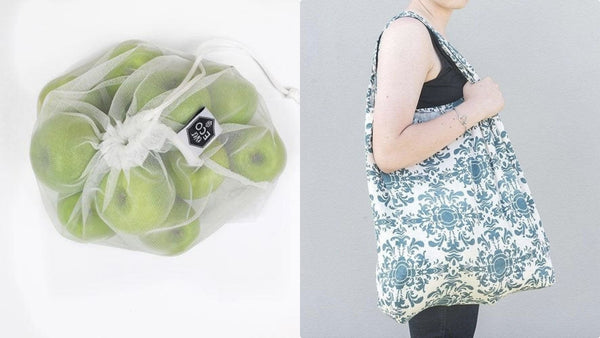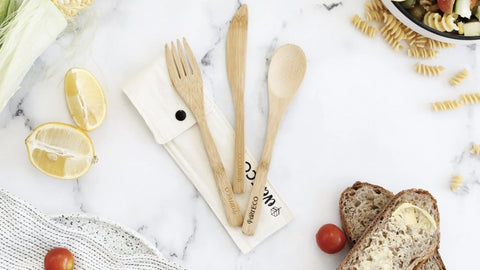
Plastic Free Ocean for Kids: How to Empower Them Towards a Cleaner Future!
Forget waiting for Plastic Free July in Australia – the fight for cleaner oceans is a year round adventure! Our oceans are more than just stunning backdrops. They're the planet's lungs, regulating our climate by absorbing CO2 and heat, producing oxygen, and teeming with life that provides food and livelihoods for millions. Unfortunately, plastic pollution disrupts this delicate balance, harming marine animals, entering the food chain, and even affecting our health.

Single use plastic pollution in Australia
Australia ranks among the largest consumers of single use plastics per person worldwide, contributing to the estimated 8 million tonnes of plastic choking our oceans every year. Research hits even closer to home, revealing that plastic makes up three quarters of the rubbish plaguing Australia's coastline. It's a grim picture, but here's the good news: change starts small and begins with our future generation. Kids have the power to change the tides!
Understanding ocean pollution for kids
Empowering kids with ocean literacy fosters not just awareness but also action. Studies show that connecting kids with nature sparks joy, fosters responsibility, and inspires them to protect what they love. Imagine the impact of every child becoming a passionate ocean advocate, inspiring them to care – not just for marine life, but for themselves and a better future.
This article will guide you and your children to explore the ocean, combat plastic pollution, unveil the secrets of responsible waste management, and unleash creativity through fun activities and eco friendly solutions.
Help kids recognise the problem with ocean plastic waste
Let's start a conversation with our children about the journey of plastic waste. Encourage them to think about the impact of their actions on the environment, and discuss what happens when they dispose of a plastic bag. Help your kids understand that their small actions can have significant repercussions. Inform them that when the wrapper finds its way into the ocean, it doesn't just disappear harmlessly. Instead, it breaks down into minuscule fragments called "microplastics." These tiny particles are easily mistaken for food by marine creatures like fishes, sea turtles, and sea birds. These unsuspecting animals ingest these plastics, causing them harm and disrupting their ocean habitats.
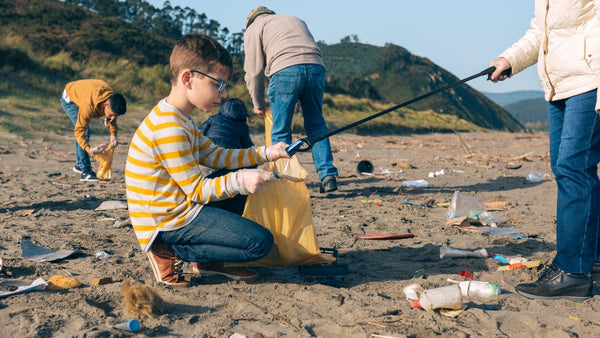
Explore marine life and talk about the triple threat
Talk to your kids about ocean plastic pollution. Help them envision the consequences: imagine majestic whales confusing food wrappers for food, playful sea turtles entangled in abandoned fishing nets, and vibrant coral reefs suffocating under plastic debris. This harsh reality plagues countless marine creatures as plastic pollution escalates in our oceans. Yet, plastic doesn't vanish; it disintegrates into smaller pieces, posing a triple threat to marine life: entanglement, ingestion and starvation, and poisoning and contamination. By discussing these issues with your children, you can empower them to become part of the solution, fostering a sense of responsibility and empathy toward our precious oceans and the creatures that call them home.
Entanglement, a prominent peril of plastic pollution, inflicts physical harm and disrupts essential natural behaviours crucial for marine survival. It can lead to drowning, suffocation, and even amputation, leaving permanent injuries or death.
As plastic breaks down into microplastics, marine animals mistake the tiny fragments for food. From small plankton to large whales, these microplastics fill their stomachs, inducing a false sense of fullness and causing malnutrition and starvation.
Plastic doesn't just harm marine animals physically; it can also poison them. As plastic breaks down, it absorbs harmful toxins and pollutants from the water. These toxins then enter the bodies of marine creatures that ingest plastic, leading to poisoning, organ damage, and even death.
Ocean conservation for kids: how to better care for the ocean
How can we inspire our children to care for the ocean in light of the stark realities of plastic pollution? Spark their fascination with the wonders of the ocean: from sea cucumbers that clean the ocean by pooping out sand to vibrant clownfish darting through their anemone homes.
To engage children with the beauty of the ocean, you can use colourful picture books that feature vibrant illustrations of marine life. You can also encourage imaginative play by giving them cute marine animal toys like Tikiri Ocean Buddies or Le Toy Van Petilou Wooden Stacking Toy - Ocean Animals.
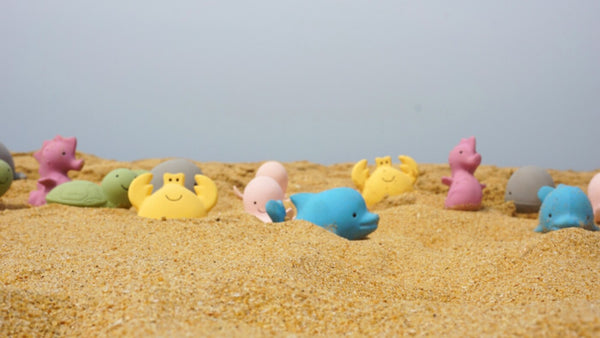
Interactive websites and educational videos can also vividly bring ocean life to light, showing experiences like swimming alongside whales and exploring hidden shipwrecks. During bath time, you can introduce sustainable bath toys like Happy Planet Toys Recycled Reef Express Submarine Bath Toys, which make learning about ocean conservation fun.
Remember, it's about sparking curiosity and passion for the seas, not lectures. Every fact learned, every playful interaction, fosters a deeper understanding of the ocean's significance. This empowers kids to become lifelong ocean advocates ready to make a difference.
Know the 3 solutions to plastic pollution: Reduce, Reuse, Recycle
Kids are the future, and their energy, creativity, and passion can be a force for change. Channelling these qualities towards positive impact begins with instilling the three R's: Reduce, Reuse, and Recycle. These simple yet powerful principles can revolutionise how we interact with our environment, particularly with plastic usage. By teaching children to consume less single use plastics, reuse more, and recycle right, we equip them to be stewards of a healthier planet.
Reduce
Challenge your kids to become plastic detectives! Help them spot single use plastics at home, school, and during play. Discuss alternatives, like swapping plastic water bottles for reusable ones and choosing fresh fruits over individually wrapped snacks. Encourage them to embrace eco friendly options such as Ethique Kids Solid Shampoo & Bodywash - Tip-To-Tot, which is gentle on their skin and entirely plastic free!
Reuse
Transform your trash into treasure by exploring upcycling projects with your kids. Turn old plastic containers into beautifully coloured planters or fun storage bins. You can also replace disposable bath mats with a durable and eco friendly alternative like the Hevea Bath Mat. Made from natural rubber, it has no harmful chemicals and is reusable - perfect for little splashing adventures.
Recycle
Recycling is a great way to protect our environment, and you can make it a fun family activity! Start by setting up a recycling bin in your home and teach your kids what items go into which bin. For an eco touch, use compostable liners like the ones from Biotuff. And remember to explain the significance of proper sorting and how it contributes to recycling and gives plastic a second life.
How to go plastic free? Inspire kids to take action!
Get your kids involved locally! Beach cleanups and recycling drives are great ways to learn, contribute, and spark their passion for the environment. Organisations like Sea Shepherd offer inclusive clean up events, empowering even young children to make a lasting impact. Seeing results firsthand can ignite their environmental spirit and inspire positive change.
Do arts & crafts with your kids!
Craft green creations! Spark your kids' eco awareness with fun arts and crafts using recycled materials like cardboard boxes, newspapers, or bottle caps. This fosters creativity while emphasising reuse and plastic reduction. Consider eco friendly kits like the Eco Art and Craft Kit to support sustainable habits further.
Allow kids to connect with nature
Ditch the screens and embrace the breeze! In our tech filled world, outdoor exploration is vital for children's wellbeing. Every nature encounter fosters an appreciation for its harmony, from park walks to beach visits. Activities like tide pooling ignite curiosity about hidden ocean life, while snorkelling trips can spark a passion for ocean conservation through vibrant visuals.
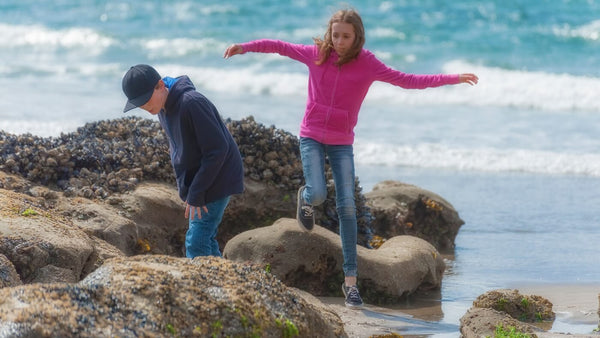
Aquariums and art exhibits provide captivating windows into the ocean's depths, offering a glimpse of underwater wonders within the confines of a structured environment. The "RIFIFI: Jean Jullien for Kids" exhibition, for example, transports young explorers to a colourful underwater wonderland, fostering a connection with marine life.
Instead of grand gestures, simple outdoor moments can spark a love for nature. Equip kids with tools like the Viking Toys Eco Bucket Set to turn everyday excursions into treasure hunts, sandcastle battles, or insect adventures. This recycled set fosters imaginative play while teaching kids about responsible choices for a healthy planet.
Lead By Example: How To Go Plastic Free
Consider replacing disposable plastic bottles with fun and reusable water bottles from brands like b.box, Cheeki, EcoVessel, and Ever Eco. Instead of using plastic bags in the supermarket, opt for stylish and reusable shopping and produce bags from Apple Green Duck, Ever Eco, or Onya. For takeaway coffee, use fashionable coffee cups from Cheeki or Ever Eco. You can also use eco friendly products from Ever Eco, We Might Be Tiny, and Weanmeister when cooking and baking with your kids.
Children are natural changemakers, eager to make a difference. Encourage them to take ownership of their plastic free journey by giving them reusable utensils from brands like Ever Eco or White Magic, as well as straws from b.box, Cheeki, Cherub Baby, Ever Eco, Go Bamboo, Little Mashies, Re-Play, or We Might Be Tiny. Let them express their personality by selecting colourful cups and dinnerware from Re-Play, Ever Eco, Bobo & Boo, or Happy Planet Toys. Involve them in packing healthy lunches with food storage containers from 4MyEarth, b.box, Cherub Baby, Ever Eco, Little Mashies, Onya, and Wean Green. This approach fosters environmental consciousness and instils a sense of responsibility and healthy habits in children.
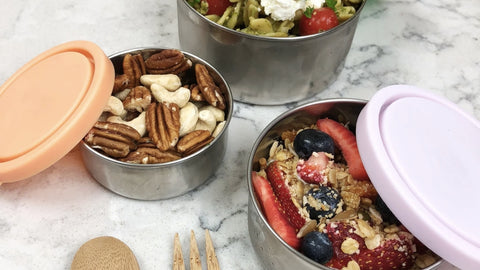 |
Small changes can make a big difference in going plastic free, and by working together, we can have a positive impact on the environment.
Tiny Hands, Big Impact: Empowering Young Ocean Guardians
Children are essential in the journey towards a plastic free ocean. Their enthusiasm and willingness to learn make them powerful allies in our sustainability efforts. By nurturing their passion and supporting their actions, we can inspire a generation dedicated to the conservation of oceans. Let's continue to encourage their involvement, reminding them that even small steps can create a significant impact. Together, we can empower our youth to lead towards a cleaner, healthier future for our oceans.






